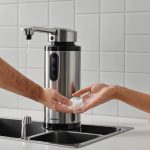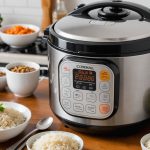Accurate macronutrient tracking can make or break your weight loss journey. This is where a high-quality digital nutrition scale steps in. Choosing the right scale not only simplifies food measurement but also boosts your confidence in making informed dietary choices. In a kitchen focused on slimming, precision is key. Discover how the most precise digital nutrition scales can transform your approach to health and help you achieve your goals—effortlessly and efficiently. Your path to success starts here.
Overview of Digital Nutrition Scales
Digital nutrition scales are essential tools for those keen on macronutrient tracking and achieving their weight loss goals. These scales not only measure the weight of food but also provide detailed nutritional information, including calories, proteins, fats, and carbohydrates. This functionality is crucial for individuals who need precise data to manage their diet effectively.
In parallel : Choosing the Ideal Automatic Soap Dispenser for a Hygienic Kitchen: Your Ultimate Guide
Accuracy in tracking is vital. A digital nutrition scale offers this precision, ensuring that users can rely on the data for informed dietary decisions. Whether you're counting calories or balancing your macronutrients, these scales help you stay on track.
Benefits of using digital nutrition scales include:
In the same genre : Choosing the Best Kitchen Wall Insulation: Enhance Comfort and Cut Down Cooking Frequency
- Enhanced accuracy in nutritional tracking
- Support for weight loss tools and strategies
- Assistance in meeting specific health goals
A relevant quote from a nutritionist highlights their utility: "Digital nutrition scales empower users by providing the exact data needed for effective diet management." This underscores their role in supporting a healthier lifestyle.
By integrating these scales into daily routines, individuals can better manage their dietary intake, making them an invaluable asset for anyone serious about health and wellness. Their user-friendly design and technological advancements make them a practical choice for modern dietary management.
Top Digital Nutrition Scales Reviewed
Exploring the best digital nutrition scales can be a game-changer for those dedicated to precise dietary management. This review focuses on three top contenders, highlighting their standout features and performance.
Scale 1: Features and Performance
This scale is renowned for its accuracy and ease of use. It offers a comprehensive nutritional database, allowing users to track a wide array of foods effortlessly. The scale's sleek design complements its functionality, making it a favorite among tech-savvy users.
- Key Specifications:
- Weight capacity: 11 lbs
- Nutritional data for over 2,000 foods
- Bluetooth connectivity for app integration
User feedback emphasizes its reliability in providing accurate data, crucial for weight loss and dietary goals.
Scale 2: Features and Performance
Designed for those who prioritize precision, this scale excels in delivering detailed nutritional insights. Its advanced features include a touchscreen interface and voice assistance, enhancing user experience.
- Pros and Cons:
- Pros: High precision, user-friendly interface
- Cons: Higher price point
Accuracy testing results are impressive, with users praising its ability to support specific health goals.
Scale 3: Features and Performance
This scale stands out with its compact design and affordability. It's a practical choice for individuals new to digital nutrition tracking.
A nutritionist notes, "This scale offers a balance of accuracy and affordability, perfect for beginners."
Key Features to Consider When Buying
Understanding the key features is essential for making an informed decision when purchasing a digital nutrition scale. These features ensure the scale meets your needs effectively.
Capacity and Weight Limits
Choosing the right capacity is crucial. Scales with higher weight limits accommodate a broader range of foods, which is ideal for diverse dietary tracking. A scale with an 11 lbs capacity, for example, offers flexibility for both small and large portions.
Calibration Features
Calibration is vital for maintaining accuracy. Scales with easy-to-use calibration features ensure that the measurements remain precise over time. Regular calibration adjustments can prevent discrepancies in nutritional data, which is essential for those monitoring their diet closely.
User-Friendly Interfaces and Connectivity
A user-friendly interface enhances the overall experience. Look for scales with intuitive designs, such as touchscreens or voice assistance, which simplify usage. Connectivity options, like Bluetooth, allow integration with apps, providing a seamless tracking process.
Consider the following when buying:
- Capacity: Ensure it meets your dietary needs
- Calibration: Regular adjustments for precision
- Interface: Ease of use and connectivity
Selecting a scale with these features ensures it supports your health goals effectively, making it an invaluable tool for dietary management.
Tips for Effective Use of Digital Nutrition Scales
Maximize your digital nutrition scale's potential with these practical insights.
Best Practices for Measuring Different Types of Food
Using nutrition scales effectively begins with understanding how to measure various foods accurately. For dry ingredients, ensure they are level in the container. When measuring liquids, use a container that fits the scale and allows for precise readings. Consistency in measuring techniques enhances accuracy.
Maintaining Accuracy Over Time
To maintain accuracy over time, regular calibration is crucial. Follow the manufacturer's instructions for calibration to ensure the scale remains precise. Keep the scale on a stable, flat surface to prevent inaccurate readings. Avoid using the scale in humid environments, which can affect its performance.
Integrating Scale Usage into Meal Planning and Tracking
Integrate the scale into your meal planning by weighing ingredients as you prepare meals. This practice ensures you are accurately tracking nutritional intake. Use the scale's connectivity features to sync with dietary apps, facilitating seamless tracking.
Consider these tips:
- Measure consistently for reliable data
- Calibrate regularly for long-term accuracy
- Integrate into meal planning for effective tracking
By following these guidelines, you ensure that your digital nutrition scale becomes an indispensable tool in your kitchen, supporting your dietary goals with precision.
User Testimonials and Experiences
Exploring real-life experiences provides invaluable insight into the effectiveness of digital nutrition scales.
Positive Feedback: Success Stories
Many users report significant progress in their dietary goals through consistent use of these scales. A user shared, "Incorporating a digital nutrition scale into my daily routine has transformed my approach to meal planning. It helped me achieve my weight loss targets by ensuring accurate portion sizes." Such testimonials highlight the scales' role in promoting healthier lifestyles and achieving success in weight management.
Challenges Faced by Users
Despite the advantages, some users encounter challenges. Common issues include difficulties with calibration and understanding nutritional databases. One user noted, "Initially, I struggled with calibrating the scale, which affected the accuracy of my measurements." Addressing these challenges is crucial for maximizing the scale's potential.
Recommendations for Improvement
Users suggest several enhancements to improve scale functionality. Recommendations include adding more intuitive user interfaces and expanding the nutritional database. A frequent suggestion is, "Incorporating a larger, more comprehensive database would greatly enhance user experience." These insights reflect the importance of user feedback in driving product development.
Consider these insights:
- Success stories emphasize the scale's role in achieving dietary goals
- Challenges highlight areas for improvement
- User suggestions can guide future enhancements












